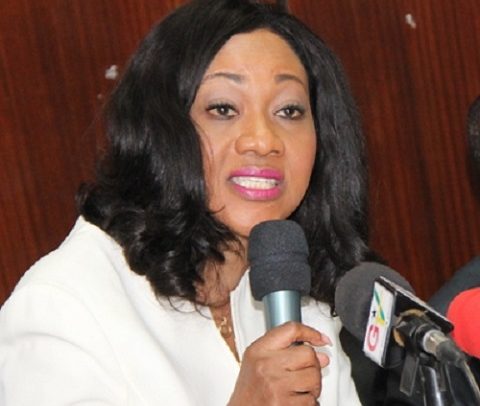Jean Mensa – EC Chairperson
An Accra High Court (Human Rights Division) has once again adjourned the hearing of an application by the Electoral Commission (EC) praying the court for another one year to implement the Representation of People Amendment Act (ROPAA).
This was after the Sampson Lardy Anyenini, counsel for the plaintiffs prayed the court for an adjournment to enable him file a supplementary affidavit in opposition to the EC’s application.
The court presided over by Justice Nicholas Abodakpi at its last sitting adjourned the matter to today because the EC’s application for extention of time had not been served on the counsel for the plaintiffs.
Appearing in court today, Mr. Anyenini prayed the court to adjourn the matter to allow him “file the supplementary affidavit to enable the applicant respondents to fully make their side of the story”.
Justin Amenuvor, counsel for the EC did not oppose the adjournment sought by his fellow lawyer, saying he has not seen the supplementary affidavit and would therefore “leave it entirely to the court to determine the way forward”.
The presiding judge subsequently adjourned the matter to April 3, 2019.
EC Application
In an application filed by the EC to ask for time to implement Act 699, the Chairperson of EC, Jean Mensa, said the Commission has been bedeviled by some challenges which affected its ability to implement the Act.
An Accra High Court (Human Rights Division) on December 17, 2017 ordered the EC to activate the process that would enable Ghanaians living abroad to vote in the country’s elections.
The court said within 12 calendar months – beginning from January 1, 2018 – the EC should lay before parliament the modalities for the implementation of the ROPAA Act so that Ghanaian citizens living abroad can take part in election 2020.
The court, presided over by Justice Anthony K. Yeboah, also ordered the EC to explain why it failed to implement the Act within one month after the expiration of the 12-month period.
It also ordered the Commission to publish the reasons in the media.
In a motion filed at an Accra High Court, the EC said the Act has not been implemented principally because of three main challenges which the EC faced shortly after the order.
The challenges, the EC Chairperson said, include the removal of Charlotte Osei and her two deputies, Amadu Sulley and Georgina Opoku-Amankwa, who were found guilty of six allegations leveled against them by some petitioners.
The EC said it failed to implement the order of the Court thereafter because of its work relating to the referenda to create six new regions in the country.
Mrs. Mensa indicated in the affidavit of support that the EC had inaugurated a committee, chaired by the Deputy Chairperson, Dr. Bossman Asare Eric.
She said the committee was working with the general public, stakeholders and other countries that are practising External Voting to take the appropriate steps for its implementation in Ghana.
She, therefore, prayed the court to give EC more time to operationalize Act 699 for 12 calendar months ending January 2020.
BY Gibril Abdul Razak


